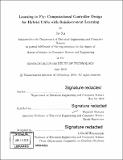Learning to fly : computational controller design for hybrid UAVs with reinforcement learning
Author(s)
Xu, Jie,S.M.Massachusetts Institute of Technology.
Download1125006571-MIT.pdf (4.005Mb)
Alternative title
Computational controller design for hybrid UAVs with reinforcement learning
Other Contributors
Massachusetts Institute of Technology. Department of Electrical Engineering and Computer Science.
Advisor
Wojciech Matusik.
Terms of use
Metadata
Show full item recordAbstract
Hybrid unmanned aerial vehicles (UAV) combine advantages of multicopters and fixed-wing planes: vertical take-off, landing, and low energy use. However, hybrid UAVs are rarely used because controller design is challenging due to its complex, mixed dynamics. In this work, we propose a method to automate this design process by training a mode-free, model-agnostic neural network controller for hybrid UAVs. We present a neural network controller design with a novel error convolution input trained by reinforcement learning. Our controller exhibits two key features: First, it does not distinguish among flying modes, and the same controller structure can be used for copters with various dynamics. Second, our controller works for real models without any additional parameter tuning process, closing the gap between virtual simulation and real fabrication. We demonstrate the efficacy of the proposed controller both in simulation and in our custom-built hybrid UAVs. The experiments show that the controller is robust to exploit the complex dynamics when both rotors and wings are active in flight tests.
Description
Thesis: S.M., Massachusetts Institute of Technology, Department of Electrical Engineering and Computer Science, 2019 Cataloged from PDF version of thesis. Includes bibliographical references (pages 51-54).
Date issued
2019Department
Massachusetts Institute of Technology. Department of Electrical Engineering and Computer SciencePublisher
Massachusetts Institute of Technology
Keywords
Electrical Engineering and Computer Science.